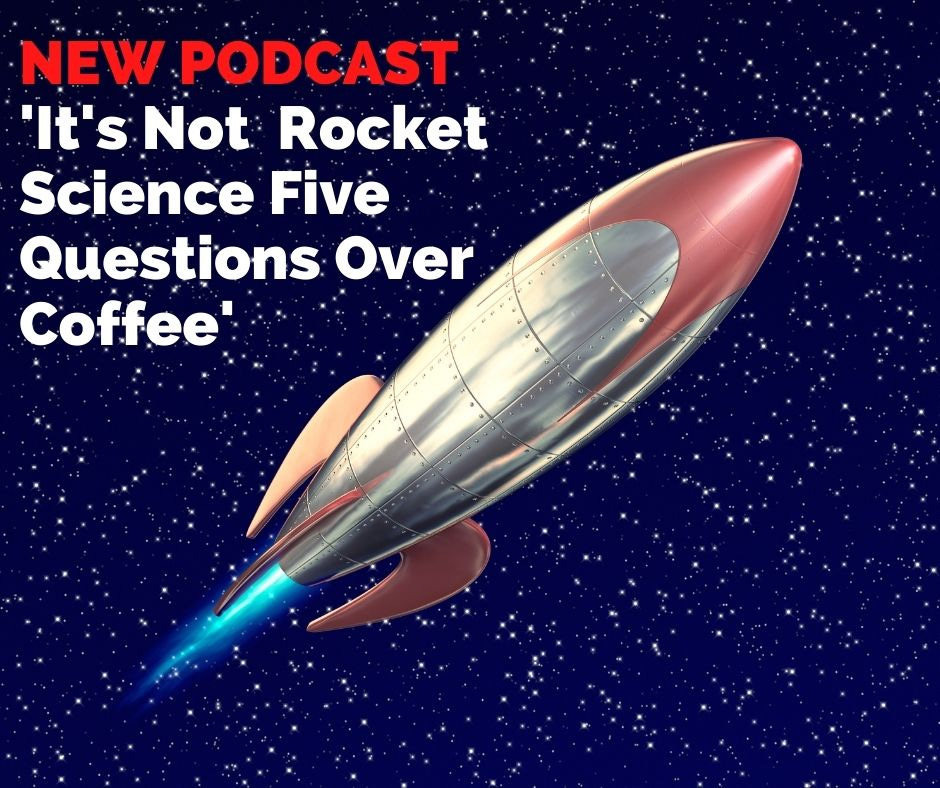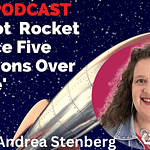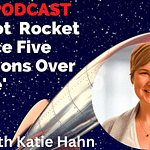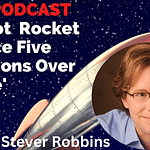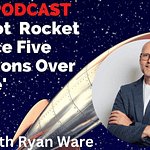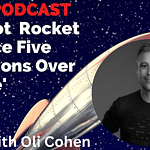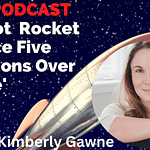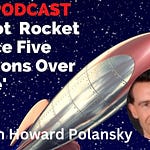Who is Jamie?
Jamie founded Bulletproof Business Services in 2018 to deliver high level business performance consultancy to business owners looking to start-up, accelerate and sustain high performance businesses.
His vast knowledge and experience comes from 14+ years at the helm of his own businesses, from his family's multi-million revenue specialist construction company, to consultancy services and tech start-ups.
Whether you're struggling with project management, managing the money or business strategy, Jamie and his team have solutions that can help.
Key Takeaways
1. See business as a system, and understand the system dynamics of that business. So how does, how do all the different actions all of the different cogs and wheels fit together? And when you change something over here, how does that affect things over here?
2. A big mistake many leaders make is not encouraging that from your clients, fear of negative feedback, or they're gonna say something we don't like, but actually, it's, it's that stuff you need to be most aware of? Yes. The gripes the complaints, the problems, like that's the stuff you need to go towards, and attack and do something about, because ultimately, that's what can make or break the business
3. Mange time by only check my emails at certain times of day. Then set another time of day to deal with the action emails at a time that's most conducive to energy levels for actually sitting down and getting stuff done.
Valuable Free Resource or Action
Jamie has a app and templates at
https://www.bulletproofbusinessservices.com
A video version of this podcast is available on YouTube :
_________________________________________________________________________________________________
Subscribe to our newsletter and get details of when we are doing these interviews live at https://TCA.fyi/newsletter
Find out more about being a guest at : link.thecompleteapproach.co.uk/beaguest
Subscribe to the podcast at https://link.thecompleteapproach.co.uk/podcast
Help us get this podcast in front of as many people as possible. Leave a nice five-star review at apple podcasts : https://link.thecompleteapproach.co.uk/apple-podcasts and on YouTube : https://link.thecompleteapproach.co.uk/Itsnotrocketscienceatyt!
Here's how you can bring your business to THE next level:
1. Download my free resource on everything you need to grow your business on a single page : https://link.thecompleteapproach.co.uk/1page
It's a detailed breakdown of how you can grow your business to 7-figures in a smart and sustainable way
2. Join The Complete Approach Facebook Group : https://TCA.fyi/fb
Connect with like-minded individuals who are all about growth and increasing revenue. It's a Facebook community where we make regular posts aimed at inspiring conversations in a supportive environment. It's completely free and purposely aimed at expanding and building networks.
3. Join our Success to Soar Program and get TIME and FREEDOM. : https://link.thecompleteapproach.co.uk/Success-to-Soar
If you're doing 10-50k a month right now: I'm working with a few business owners like you to change that, without working nights and weekends. If you'd like to get back that Time and still Scale, check the link above.
4. Work with me privately
If you'd like to work directly with me and my team to take you from 5 figure to 6 and multi 6 figure months, whilst reducing reliance on you. Click on https://link.thecompleteapproach.co.uk/DiscoveryCall tell me about your business and what you'd like to work on together, and I'll get you all the details.
————————————————————————————————————————————-
Transcript
Note, this was transcribed using a transcription software and may not reflect the exact words used in the podcast)
Stuart Webb 00:42
Again, folks, excuse me and welcome to It's not rocket science five questions over coffee. I'm here with Jamie Keeling. Jamie is the bulletproof business coach. I'm sure he's going to explain more about what that means. And we're gonna have a great discussion over the next 1015 minutes however long Jamie was talked to us for so I hope you've got your coffee ready. You're ready for this? And Jamie, welcome to Yes, brilliant. Welcome to It's not rocket science five questions over coffee.
Jamie Keeling 01:12
Thank you very much for having me. Stuart's pleasure to be here.
Stuart Webb 01:14
No problem. So Jamie in in just a few sentences, can you give us the lowdown on who your ideal client is the problems that they face.
Jamie Keeling 01:26
I work with a lot of people who are starting new businesses, particularly over the last 12 months. It's just been interesting with all the lockdowns and the effects of the pandemic, there's lots of people who are thinking more entrepreneurially. So I've been writing lots of business plans for them in terms of helping them get startup funding, and generally create a a good solid action plan, based in reality based in numbers that can help them achieve business success. So startup business owners, new entrepreneurs is definitely a key market for me, but also established entrepreneurs, people who, generally speaking who are very good at their trade, they know they're the front facing part of their business very well. But there's holes in their knowledge when it comes to the business aspects. Because when you run a business, you've got to have two skill sets, right? You've got to have the trade the product or the service knowledge that you deliver. But you also know how to run a business. And that's a separate skill in and of itself. So established business owners from a few 100,000 turnover to multiple millions in turnover. I work with them at the director level to help them develop strategy, implement strategy, help to hold them accountable, to make sure they get the results that they want in business.
Stuart Webb 02:42
Brilliant. So what are the sort of problems that you've been, you've been helping them with one of those, those things they've been trying to solve on their own without help from somebody like yourself?
Jamie Keeling 02:53
A lot of it comes down to being able to see business as a system, and understand the system dynamics of that business. So how does, how do all the different actions all of the different cogs and wheels fit together? And when you change something over here, how does that affect things over here? So it's, I think the biggest thing is helping them to understand the numbers, and actually have some numbers have some numbers looking at you know, whether that that's traditional KPIs, or managing cash flow. KPIs are a big one, I think for me, because, you know, when, when you put a number to something, it makes it real. And it's measurable, it becomes something rather than being a concept of what you would like it to be. And you start to get very specific, because when you start to put numbers to things, you start to then be able to say, Well, okay, so how are we going to get from this number where we are to this number where we want to be? And so that's really powerful. So it's about looking at when I go in with a client or look at the business as a system. And this is true for business plans, right at the startup stage right through to established businesses is first mapping the system is looking at what are all the different moving parts, and then finding the weak links, which bits aren't working so well, or are incomplete or even don't exist at all. And then we'll start to build a strategy, that action plan around strengthening or inserting links in the chain that need to be there.
Stuart Webb 04:22
It's interesting you say that, actually, Jamie, it reminds me of a story I'm sorry to take over with a story of mine. But I worked with a business owner who was in the process of taking on a business. So it's not not necessarily somebody was establishing a business, but they were buying somebody else's business. And he asked me to just go in and have a look at what was going on in the business. And through that action. We discovered a bit of the bit of the business that just hadn't been properly exploited. And as a result, he developed a completely new service from a business that didn't even know it was there so often that process of uncovering produces not only the sort of links you need to grow the business but stuff that you didn't even know was there that was hidden under the surface. Somehow, just by asking the right questions just by going in and starting to talk to the right people, you get to the sort of, you know, even things that didn't exist. And this was just a, you know, input that was coming in from customers that they hadn't recognised was something you could use to exploit to become a new service.
Jamie Keeling 05:16
It's amazing how much data there is available in a business. Yes,
Stuart Webb 05:21
even if that data is just conversations often, isn't it?
Jamie Keeling 05:24
100% Yeah. And feedback from customers and clients is a big part of that, you know, a big mistake is not encouraging that from your clients, fear of negative feedback, or they're gonna say something we don't like, but actually, it's, it's that stuff you need to be most aware of? Yes. The gripes the complaints, the problems, like that's the stuff you need to go towards, and attack and do something about, because ultimately, that's what can make or break the
Stuart Webb 05:48
business. Each of those are opportunities. Let's face it, isn't it? So so often, we look at those as negative but an actual fact. And that's just an opportunity that you haven't yet exploited? So yeah, so we could obviously talk for this talk on this for many hours. And perhaps we should but but let's move on to the things that are, the more important what's the the valuable free action or valuable free resource that you can give to the audience that would help them in some of the problems we're discussing at the moment?
Jamie Keeling 06:13
Well, there's two things. The first is my app, I've developed a bulletproof app, which is basically a resource for business owners that contains a vault of tools and templates that they can use when it comes to business development and business management. There's also a free course on there for budding entrepreneurs, people who are new to or just getting into business, which is a free course on how to start a business. And that, that comes with the tools and resources, the templates that they will need to guide them through that process as well. And it takes them from if needed, deciding what their business idea should be based on their qualifications, their skills, their experience, and their interests, helps them to catalyse all of that in a meaningful way that then results in a meaningful and hopefully profitable business idea, and takes them right the way through then to actually launching that business, hopefully, in a successful way. So the more than welcome to go and check that out. You can get that on the Google Play Store or the App Store. And it's free to download the news. The other one would be my own podcast, which is optimised me now which I've been running for three years, there's over 100 episodes now. And it's an interview series where I speak to it's very similar to this actually, where I speak to other successful business owners, martial arts world champions, people who've been through some serious adversity and find out how they did it, basically, you know, what, what led you to where you are today? How did you overcome the challenges and the struggles that were put in your way? And what advice can you give to other people who might be facing similar things, and I've really enjoyed that, that interview series. It's been extremely, I mean, purely selfishly. From my point of view, I've learned a hell of a lot. And it's been a real privilege to speak to such amazing people in so many different ways. And I really, but I know that the listeners, the audience already has got huge value out of that, and hopefully your audience can say,
Stuart Webb 08:08
brilliant. Thanks very much, Jamie. So, Jamie, we're moving through this very rapidly. So let me just come to the fourth. My question is, what's the contact book or programme that's most been impactful in your experience that you want to share?
Jamie Keeling 08:27
I've thought about this question quite a lot. Because I've read a lot of books. I went through a phase over a period of years where I was reading 50 books a year. And I've read a lot of great books. I think the one for me that has really stuck out that's purely business related will be Ray Dalio, his principles. It's a huge book. But I've read it four or five times because it's so valuable. And the thing with books like that is, you take so much away from it the first time you read it, but then when you read it a second time, all this other stuff jumps out, and then you read it a third time, and all this other stuff jumps out. So don't underestimate the power of when you find a good book, reading it more than just once. And I think the other piece of advice I would give to people around books is there's a lot of books. You know, if you just look at the business section of books on Amazon, for example, there's hundreds of 1000s if not millions of titles. You don't have time to read them all. If you do the math, I'm I'll be 35 this year. I've got probably, well hopefully, let's say 65 years left on this planet, let's go for around 100 If I'm reading even 50 books a year, we can do the math, 65 years left times 50 books, that's 3250 books. And there's hundreds of 1000s on business alone. And that's quite a scary thought to know that you just simply cannot get through all the content out there. And I make this point because it's very easy to get drawn into the trap of thinking that volume equals quality. And it doesn't. Just because you're reading 50 books a year, doesn't mean that you're necessarily learning everything that you should be, and certainly not implementing everything that you should be. So my advice to everybody would be when you find good books, or books that keep getting getting recommended by people who you look up to who you admire, who have achieved the things or similar things to that which you want to achieve, read them and read them again, and read them again and read them again, because there's so much you can pull out of those books, and you will not get it on the first go around. But the thing is, generally speaking, people are very good at reading books, very good at taking courses, very good at watching videos on YouTube, where they fall down as the implementation is actually taking what you've taking what you've learned, and thinking, right? How am I going to put this into my world into my business? How am I going to use this to improve my results, and actually then going and doing it, and there's a huge amount of testing and fumbling in the dark involved in that. Because just because something worked for somebody else doesn't necessarily mean it's going to work for you, or indeed, that is what you need. So you've got to kind of try stuff on for size, see what works, and then do more of that. I mean, it's like marketing, isn't it, like, you throw a bunch of stuff at the wall. And then the stuff that sticks you do more often the stuff that doesn't you push to one side and try something new. And it's the same with the stuff that you read in books. So my advice is, find the good books, find the ones that are really relevant to you in your journey and where you want to be. And, you know, maybe maybe create a shortlist of 30 to 50 of them. And rather than reading 50 new books a year, just reread those 50 books every single year, but make the effort to implement the things that you're learning.
Stuart Webb 11:57
And if I can add one point, your implementation show me because I think you're making a really valuable point and that the implementation is the secret sauce, of actually getting something to happen in your business. A long time ago, a mentor said to me, if you can get up and be in your office, let's say you get into your office at eight o'clock in the morning, I get in a fair bit earlier than that, because I actually like to do what you're doing. The first part of my morning is doing some reading and just some general education because I think the profession needs that sort of approach. But if I can take that, that reading, if I can take that, that that what I want to achieve that day, and if I can not get to my emails, but if I can spend the first part of my morning achieving the one thing that day that will move my business forward, you will have achieved more than 99% of the people that you're currently competing with. Because most of the people will do their emails, and they will never have achieved the one thing that will move their business forward. So just get into your office do that one thing that move your business forward, even if that's one thing that's send an email, or write a letter, or write that accurate copy of whatever it is, if you do that one thing, you are 99% ahead of most of your competition, because they will be stuck in their emails and not implementing, they'll be thinking, and if you can implement your you'll be ahead of them. So I think Jamie's right implementation is the secret sauce to actually making your business more successful.
Jamie Keeling 13:20
And an emails I just want to add to that emails can be a real killer. And I've experienced this firsthand in previous businesses and seen other business owners suffer for it. Like I've seen people literally reply to emails all day, all day, and they've got nothing done and you walk away from the day and like you've you've slaved guts out, you've been in the office from seven till seven or however long it is. But you've not actually achieved anything apart from just having these circular conversations via email. Because of course, when you get to a certain amount of emails, by the time you've responded to them all the people you responded to first responded to you, and then you've got a whole tranche of more emails to deal with. So I think email management is, is really, really important in terms of managing your time. And I've got strict rules. When it comes to this. I've got three folders that I use, and I got this from the productivity ninja, but it works an absolute treat. I've got three folders, action, read and track. And so I can go through a list of 200 emails and deal with them all in about five minutes. And the rule is if I can, if I can deal with what an email wants in two minutes or less than I'll do it there. And then as I'm going through the list, anything else goes into one of those three folders. So action is stuff that I need to do. Read is stuff that I don't need to do anything with. But I need to assimilate the information. So I can do that in one of my energy levels. So I've just had lunch. My body's busy digesting the food, there's less energy available for my brain. That's a good time for me to sit down after I've eaten and read those emails. And then tracking tracking is hugely important my previous business As far as managing a team of 60, I had a lot of different people with lots of different tasks across all departments to keep track of and make sure that everybody else did the things that they needed to do. That was my primary role as managing director. And the tracking folder was invaluable for that every email that came through whether it was one that I sent, or one that was sent by someone outside for organisation, or someone from inside or organisation, if I needed to make sure that something got done by somebody, it went in there. And then every Friday, I'd go through that folder and ping off reminder emails and check email so that people that needed to be checked on, and I never missed anything. And they used to hate it, because I was on them for every single little thing. But it made sure everything got done and nothing fell through the cracks. The other thing that I do as well is I will only check my emails at certain times of day. So usually it's around 10am and 3pm is when I'll sit down, and I'll do that process. I'll go through the emails. And then I'll set another time of day to deal with the action emails at a time that's most conducive to my energy levels for actually sitting down and getting stuff done.
Stuart Webb 16:06
Yeah, I had a conversation, I have a similar process, I check my email three times a day. And the reason I do that is because my dad, who was a sales director, from the old days when they didn't have email, told me he said, we used to deal with letters three times a day morning when my secretary book posting at lunchtime when I needed to fire off a bunch of things that had happened that morning. And in the afternoon when the post came back in. Why is email any different to that? And I'd say to him, because it is new, but no, it's not. It's no different at all. It's the same communication. It's just been moved from a letter to a to a screen as he will put it. And I looked at him and thought he may have a point, he might have a point. And he's absolutely right. There's no need to check your email more than three times a day. I'm with you. I can I can go through my emails, and I can get them done in about 15 minutes, that's three times a day. 45 minutes a day on emails is more than enough. But let's not let's not keep going on this. Let me ask you the final question in the in the, in the few minutes. We've got that? What's the one question I should have asked you, which I have not yet asked you? And if you don't mind not only giving us that question, but the answer as well, because otherwise we'll be left hanging for the answer.
Jamie Keeling 17:14
What a great question. What's the relationship between numbers and action?
Stuart Webb 17:24
Mm hmm. I like the question. Now that I'm looking forward to the answer.
Jamie Keeling 17:34
Numbers, you turn numbers into actions and actions turn into numbers, right. So you take actions in a business. And that translates into data, whether that's customer service data, whether that's sales data, profitability data, turns into numbers, essentially. So turns actions, create numbers, those numbers, then, if you manage them, and read them, and understand what they mean properly, you can then turn those numbers into more actions. And it's that circular system of numbers become actions, actions become numbers, that it's really important as a business owner and entrepreneur to understand. And it's, it's one of the reasons why you really must have a handle on your data capture your data management, and your data analysis, whether that's from a customer service point of view, or from an Accounts point of view. Because when you understand those numbers and their relationships to each other, from that you can then derive meaningful actions that can produce more of the results that you want and less of the results that you don't want in your business. So just that one simple thing of understanding that your actions should become numbers. And if you're taking actions that don't turn into numbers, why are you taking those actions? Why are you doing it? Now, it could be one of two things either, you don't need to be doing it and you're doing it when you should really stop. Or actually, there's data that's not being captured that should be that's valuable to you, because it's an action you need to take but you don't know what the external effect of that is on the internal effects of that is in your business. So actions turn into numbers, numbers turn into actions. So understanding that relationship in the wider system of your business, I think is really important.
Stuart Webb 19:18
I think it's a really key concept and I know many consultants is that have been built upon KPIs scorecards, understanding those numbers, and often wasting the time around them. So do not waste time around understanding what your plate is about. It's really valuable. Jamie has been a hugely interesting conversation. I appreciate your time and coming on and spending a few minutes with us. I just like to point out if if people watching are interested in being able to get onto the news list, so these other lists so they can hear when we're doing these we you know, the day before we do this, we blast out on all the people we know about not social media. We're coming up with one of these conversations that hugely interesting, hugely valuable Jamie has just added huge value to you. and I hope you've appreciated it. But if you want to get on and listen to what we're doing go to TC a dot FYI, it's very simple TTA dot FYI, forward slash subscribe, even somebody as simple as I can understand how to get onto that list. And then you'll get to hear great conversations with people as interesting as Jamie. Jamie, thank you very much for spending a few minutes with us. I really appreciate the value added. I think some of the stuff you've been saying is absolutely the right way to go. I know because it's sort of stuff I preach. Otherwise, I wouldn't be talking to people like you. We are to build up the right thinking yet. We don't want to take people down the wrong path. So Jamie, thank you very much for your time. Really appreciate it. Speak to you very soon.
Jamie Keeling 20:38
It's been a pleasure. Thanks very much for having me.
Stuart Webb 20:40
No problem. Bye bye.



